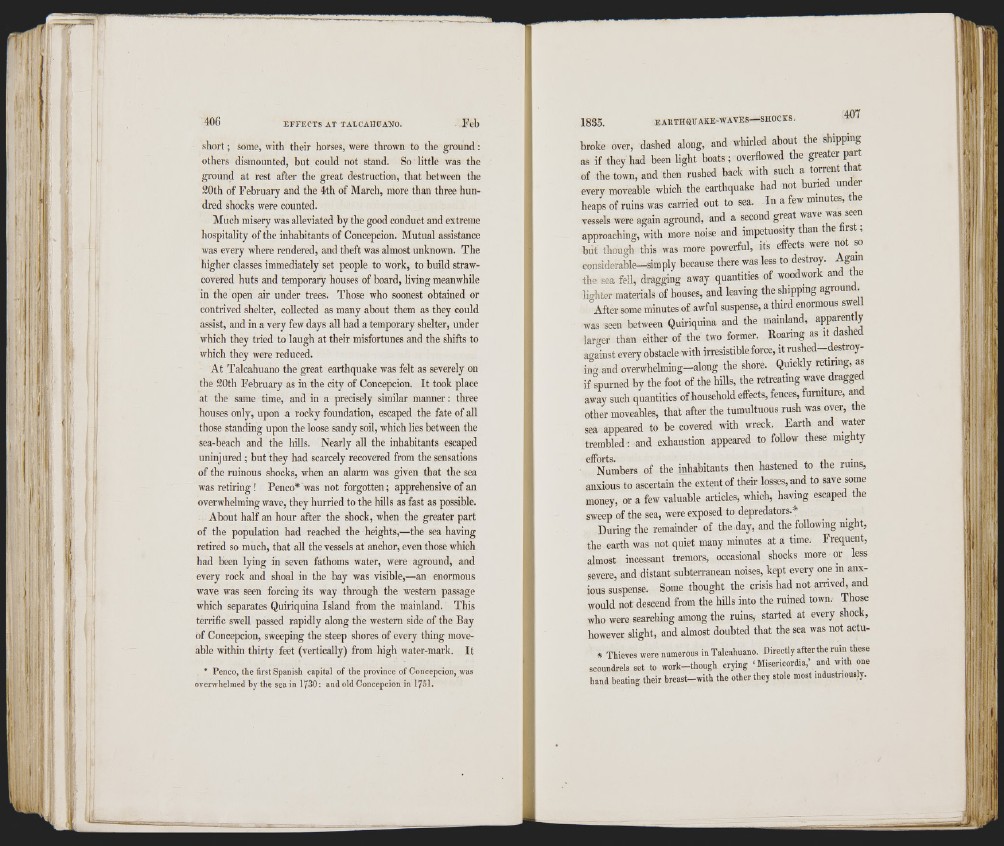
l u
lit
111) '■
)i 1 0'
! ' '■
406 EF FECTS AT TALCAHUANO. Feb
short ; some, with their horses, were thrown to the ground :
others dismounted, but could not stand. So little was the
ground at rest after the great destruction, that between the
20th of February and the 4th of March, more than three hundred
shocks were counted.
Much misery was alleviated by the good conduct and extreme
hospitality of the inhabitants of Concepcion. Mutual assistance
was every where rendered, and theft was almost unknown. The
higher classes immediately set people to work, to build straw-
covered huts and temporary houses of board, living meanwhile
in the open air under trees. Those who soonest obtained or
contrived shelter, collected as many ahout them as they could
assist, and in a very few days all had a temporary shelter, under
which they tried to laugh at their misfortunes and the shifts to
which they were reduced.
At Talcahuano the great earthquake was felt as severely on
the 20th February as in the city of Concepcion. It took place
at the same time, and in a precisely similar manner : three
houses only, upon a rocky foundation, escaped the fate of all
those standing upon the loose sandy soil, which lies between the
sea-beach and the hills. Nearly all the inhabitants escaped
uninjured ; but they had scarcely recovered from the sensations
of the ruinous shocks, when an alarm was given that the sea
was retiring ! Penco* was not forgotten ; apprehensive of an
overwhelming wave, they hurried to the hills as fast as possible.
About half an hour after the shock, when the greater part
of the population had reached the heights,—the sea having
retired so much, that all the vessels at anchor, even those which
had been lying in seven fathoms water, were aground, and
every rock and shoal in the bay was visible,—an enormous
wave was seen forcing its way through the western passage
which separates Quinquina Island from the mainland. This
terrific swell passed rapidly along the western side of the Bay
of Concepcion, sweeping the steep shores of every thing move-
able within thirty feet (vertically) from high water-mark. It
• Petico, the first Spanish capital of the province of Concepcion, was
overwhelmed by the sea in 1730 : and old Concepcion in 1751.
1835. EAl lTHQUAKE-WAVES SHOCKS,
broke over, dashed along, and whirled about the shipping
as if they had been light boats ; overflowed the greater part
of the town, and then rushed back ivith such a toraent that
every moveable which the earthquake had not buried under
heaps of ruins was carried out to sea. In a few minutes, the
vessels were again aground, and a second great wave ®
approaching, with more noise and impetuosity than t e rs ,
hut though this was more powerful, its effects were not ro
considerable—simply because there was less to destroy. Again
the sea fell, dragging away quantities of woodwork and the
lighter materials of houses, and leaving the shipping aground
After some minutes of awful suspense, a third enormous swell
was seen between Quiriquina and the mainland, apparent y
larger than either of the two former. Roaring as it dashed
ao-ainst every obstacle with irresistible force, it rushed—dratroy-
iU and overwhelming—along the shore. Quickly retiring, as
if Uurned by the foot of the hills, the retreating wave dragged
away such quantities of household effects, fences, furniture, an^d
other moveables, that after the tumultuous rush was over, the
sea appeared to be covered with wreck. Earth and water
trembled; and exhaustion appeared to follow these mighty
^ Numbers of the inhabitants then hastened to the rums,
anxious to ascertain the extent of their losses, and to save some
money, or a few valuable articles, which, having escaped the
sweep of the sea, were exposed to depredators.*
During the remainder of the day, and the following night,
the earth was not quiet many minutes at a time. Frequent,
almost incessant tremors, occasional shocks more or less
severe, and distant subterranean noises, kept every one in anxious
suspense. Some thought the crisis had not arrived, and
would not descend from the hills into the ruined town. Those
who were searching among the ruins, started at every shock,
however slight, and almost doubted that the sea was not actu-
* T h i e v e s were numerous in Talcahuano. Directly after the ruin these
scoundrels set to work-though crying ■ Misericordia,’ and with one
hand beating their breast-with the other they stole most industriously.
I